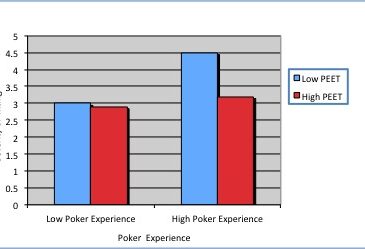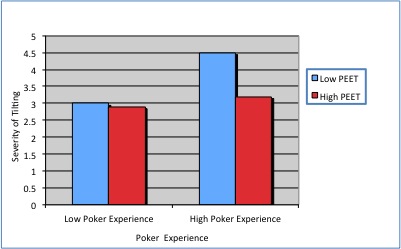Tilting is a poker term used to describe the choice of sub-optimal and risky betting strategies due to frustration, anger and other reactions to gambling outcomes. Previous studies have shown that skills necessary to control tilting (e.g., regulating negative emotions) might be acquired with experience (Palomaki, Laakasuo, & Salmela, 2012a). However, no study has directly investigated the phenomenon of tilting. This week’s WAGER reviews a study that examined if poker experience and emotional sensitivity are associated with “tilting” betting behavior (Palomaki, Laakasuo, & Salmela, 2012b).
Method
Four hundred seventeen poker players recruited from Finnish online poker communities completed an online survey.
- The researchers assessed the following variables:
- Poker experience measured by a 3-item scale (e.g., “What is the rough estimate of how many poker hands you have played during your life?”; 1 = “0–50,000”; 10 = “more than 5 million”).
- Emotional sensitivity to losses measured by an 11-item Likert-type scale (e.g., “I feel losing is unfair”; 1 = “Completely disagree” to 7 = “Completely agree”).
- Perceived effect of experience on tilting measured by a 4-item Likert-type scale (e.g. “The more poker experience I have gained, the less frequently I have tilted”; 1 = “Completely disagree” to 7 = “Completely agree”).
- Severity of tilting measured by a 4-item Likert-type scale capturing intensity, frequency and perceived harmfulness (e.g., “On estimate, how many times have you tilted within your last 6 months of active poker playing?”; 1 = 0; 7 = ‘More than 10’).
- The researchers built a multiple regression model predicting severity of tilting from poker experience, emotional sensitivity, perceived effect of experience on tilting, and their interaction.
Results
- More experienced poker players reported tilting more severely (B = 0.22, t(412) = 5.75, p < .001).
- Higher emotional sensitivity to losses was associated with more severe tilting (B = 0.598, p < .001).
- Participants who believed their experience had reduced their tilting, not surprisingly reported less severe tilting in the past 6 months (B = -0.25, t(412) = -5.44, p < .001)
- Figure 1 shows a significant interaction between poker experience and the perceived effect of poker experience on tilting (B = -0.12, t (412) = -5.61, p < .001). Players with little poker experience reported similar severity of tilting regardless of their perception of the effect of experience on tilting. However, relatively experienced players reported more severe tilting if they reported low perceived effect of poker experience on tilting.
Figure 1. Interaction effect of perceptions and poker experience on self-reported tilting behavior
Note. PEET = perceived effect of experience on tilting.
Limitations
- This is a correlational study; therefore we cannot conclude if poker experience leads to severe tilting or people who are inclined to severe tilting tend to play poker more.
- Measures of gambling activity are derived from self-report and might not accurately reflect behavior, feelings, or thoughts. In particular, participants’ perceptions of the effect of experience on tilting likely relate to their reports of past 6-month tilting because both questions measure perceptions.
Conclusion
Experienced poker players reported more severe tilting than inexperienced players did. Experienced players might encounter more tilting-provoking situations because they play more tables, rounds, and hands of poker, compared to novice players. Another explanation of the positive association between poker experience and severity of tilting is that experienced players might have a different perception of what tilting means compared to that of less experienced players. For example, experienced players may believe they are “losing control” in the same situations in which non-experienced players believe they have full control. It might also be that those who think their poker experience helps to control tilting also think they tilt less. Future research could conduct a true experiment, manipulating experience or a longitudinal study to assess the temporal relationship between poker experience and tilting. Future studies should also use more objective measures of tilting (e.g., by evaluating actual wagering behavior).
-Julia Braverman
What do you think? Please use the comment link below to provide feedback on this article.
References
Palomaki, J., Laakasuo, M., & Salmela, M. (2012a). "Don't Worry, It's Just Poker!"-Experience, Self-Rumination and Self-Reflection as Determinants of Decision-Making in On-Line Poker. Journal of Gambling Studies.
Palomaki, J., Laakasuo, M., & Salmela, M. (2012b). Losing More by Losing It: Poker Experience, Sensitivity to Losses and Tilting Severity. Journal of Gambling Studies, (Epub ahead of print).
————————————-
Notes
- The researchers defined tilting to participants as “a strong negative emotional state elicited by elements of the poker game (e.g., “bad beats” or a prolonged “losing-streak”) that is characterized by losing control, and due to which the quality of decision-making in poker has decreased.”






Michael Laakasuo November 9, 2012
I think that Emotional Sensitivity to Losses explains more variance and is more interesting then PES or PEET. To some extent it even mediates the effects. This would suggest that bad decisions and tilting in poker are better explained by being a “sore loser” than any of these other variables.
I am the person who did the analysis and designed the questionnaires in this study. Even though I am flattered by the publicity of my work, I would like to note that this is selective reporting. IMHO you should have concentrated on Emotional sensitivity rather than these other things. Selective reporting is often connected with political aims.